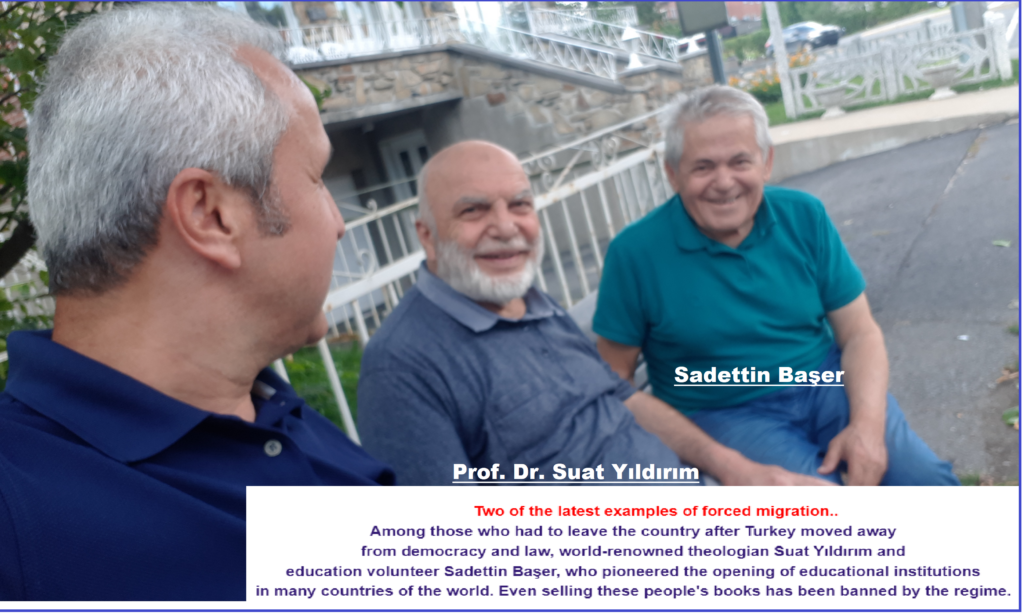Viewpoint
Who would want to leave their homeland if there was no necessity?

Throughout history, no nation or society has left its place and geography without a compelling reason and pressure. Even people living in deserts and glaciers did not complain about the climate and leave the lands where they were born and raised. Nature did not do the evil that humans did to humans to those living there. The most important factor in human migration throughout history has been the cruel and unlawful intervention of people towards each other.
My friend of 40 years, Sadettin Başer, who has been to more than a hundred countries in the last 30 years and has been a pioneer in opening qualified educational institutions there, recently said; I saw temperatures of minus 60 degrees in Yakutia. If you stayed outside for 10 minutes, you would get cold burns on your face. There were even cases of ankle fractures in those who were exposed to this cold for a longer period of time. But no one thought of leaving the places where they were born and raised. The situation was no different in the African Sahara. Because they saw the lands they lived in as their homeland. As long as there are no human-caused negative factors, everyone is generally satisfied with the geography they live in.
Throughout history, the primary factor in migration has been either the occupation of a country, that is, wars, or the injustices, lawlessness and livelihood difficulties faced by people in countries destroyed by corruption. Recently, the most obvious examples of the first of these are Ukraine and Yemen, and the second are Turkey and Afghanistan. In recent years, more than 10 thousand qualified doctors, academics and scientists in Turkey had to flee the country due to regime pressure. Hundreds of thousands of people who did not support government policies had their passports revoked. They were prevented from leaving the country by the regime. But they were not given the opportunity to find a job within the country. They had no choice but to leave the country via the Evros River and the Aegean Sea. This wasn’t easy at all. Thousands of people drowned and lost their lives on this journey. Even the bodies of babies began to wash up on the shores.

With all this, migration is not only a problem of those who migrate because of the problems they experience in their country. Irregular large waves of migration also cause serious problems and debates in the countries of immigration. For example, in the Netherlands, the anti-foreigner Wilders-led party won the majority in the parliament in November. In Germany, a far-right party with similar policies achieved significant success in state elections. In Finland, a far-right party took part in the government. In the USA, former President Donald Trump’s anti-immigrant attitudes have also become the policy of the Republican Party.
Partially different from the previous ones, there was a significant change in immigrant movements in 2023. Many immigrants began to transit to second or third countries after their first destination. When immigrants were disappointed because they could not meet their expectations in the first countries they went to, they moved to second and third countries in search of better living conditions and opportunities. More importantly, some countries have made decisions to send back immigrants fleeing violence within the framework of their internal security and migration management policies. Options for forcibly sending immigrants who have reached European countries but are unwanted there to Africa or Turkey have also begun to be discussed.
While refugees escaping from Ukraine initially sought refuge in neighboring countries such as Poland, over time they moved to more western European countries. By 2023, Germany hosts 1.2 million Ukrainian immigrants, reaching the highest annual population growth rate since World War II.
When the highly educated young population emigrated, especially from Turkey and Ukraine, a competitive environment began to emerge in the world for qualified immigrants. With the change in the labor market concept and the impact of technological developments after the pandemic, the search for qualified immigrants has increased. Countries such as Germany, Canada, Australia and the USA have offered various incentives to attract highly skilled immigrants.
When every task in daily life began to be done with applications downloaded to mobile phones, the motivation of the educated young population, who used them best, to move out of the country increased even more. Because even when they were escaping their countries, they had the opportunity to use these to ensure road safety and quickly hold on to life in the countries they went to.
There is a fact that; If democracy, law, social justice, gender equality, basic human freedoms and income distribution were implemented fairly all over the world, no one would have the intention of leaving the lands they live in. If the flow of irregular migration around the world is to be prevented, the world should focus on these basic issues first.
by Osman Ozsoy





